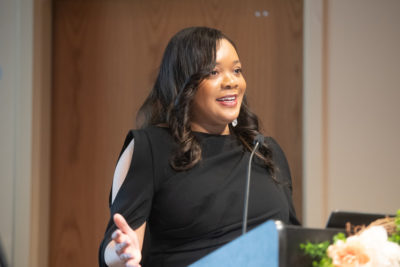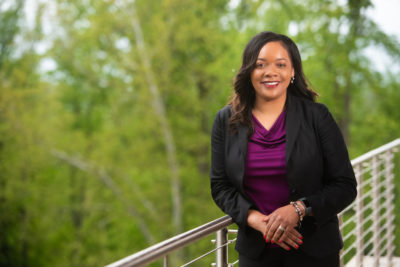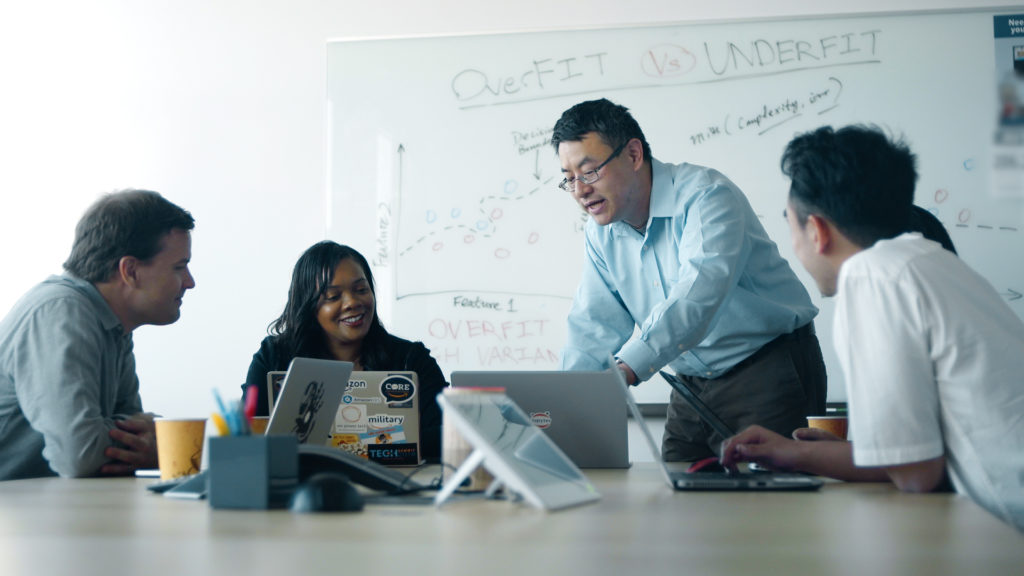Thirty years ago, Francessca Spencer Vasquez ’00 went to watch the Berlin Wall come down.
She lived in West Germany at the time, where her father was enlisted in the U.S. Air Force. Growing up in a divided country, she saw the powerful impact of physical and ideological barriers. While the West was advanced and enjoyed freedom, the East was mired in the past so much that people risked their lives to cross the Berlin Wall.

Then, in November 1989, the East German government announced its citizens were free to cross to the West. A month later, millions of people gathered when the government opened Brandenburg
Gate to provide a permanent passage between East and West Berlin. Although much of the wall remained for another year, the open gate symbolically toppled the wall. The barrier was gone.
Vasquez and her mother were there. “It was a celebration,” Vasquez said during a talk at the University of Lynchburg’s Multicultural Gala this past spring. “Nobody cared about gender, race, orientation, or any other demographic. We were just a human race — connected through empathy, compassion, and joy. … We were hugging complete strangers in the streets of Berlin.”
The scene made an impression on her. “It was in this moment that I accepted my truth, that I was uniquely me, a woman of color living in a foreign country, having an Italian name, and oddly being very comfortable being uncomfortable in this place we called home for that season of our lives.”
Today, Vasquez helps walls come down in a different way as the director of solutions architecture and customer success for Amazon Web Services in the Americas. She leads an international team that helps companies use cloud computing technology to transform their business. When she talks about cloud technology such as machine learning and artificial intelligence, Internet of Things (IoT) and Serverless Computing, you can hear the thrill in her voice.
For Vasquez, it’s not about cool gadgets and apps. It’s about how those things connect people and communities and give power to innovation and ideas.
The builder
At Lynchburg, the mold didn’t matter.

Vasquez calls herself a builder. The term stems from Amazon’s desire to create what founder Jeff Bezos called “a culture of builders — people who are curious, explorers [who] like to invent.”
The word applies to Vasquez in several ways. She builds rapport and relationships easily, and it only takes a short conversation before it feels like she’s known you for years. In her day job, she works with “solutions architects” from all across Amazon and helps her customers create their culture of builders. She also builds her life and career with a mindset of innovation.
This is how she described her approach to life in a Lynchburg College Magazine essay during her senior year: “We cannot become who we need to be by remaining who we are. We must invent ourselves every day. … Determination and ambition often characterize my visionary drive of setting new goals and conquering challenging opportunities.”
She inherited some of that drive from her mother. After the family moved back to the United States and settled in Virginia, her mother encouraged her to take a computer programming class. “I did not look back,” Vasquez said in an interview during her last visit to Lynchburg.
“I’m a very curious learner who happened to be pretty decent in math. I was a bit of a closet gamer. I was masterfully working through games like ‘The Legend of Zelda,’ and I was fascinated by technology and software at that time.”
After filling out an information card for Lynchburg College at a college fair, she heard from a Lynchburg professor within 48 hours. She decided to visit, and she loved the personal attention she received on campus.
She was impressed that Dr. Tom Nicely, a computer science professor who received national attention for discovering a bug in the Pentium computer chip, made his research accessible to students.
Other math and computer science professors, including Dr. Conny Roussos and Dr. Barry Lobb, also showed a dedication to individuals. “I really wanted to learn from that team,” Vasquez said.
Her experience as a student lived up to the expectations set by the visit. “When I set foot on this campus, the sense of community was instant,” Vasquez said. “I felt engaged. I felt listened to, I felt supported. It continued through my entire four years here. My professors became my mentors. They personalized my journey, which kept my interest high.”
She enjoyed working with other students who shared her interest in technology. Before college, she had been a “closet gamer” because she didn’t think she fit the mold of a computer geek. At Lynchburg, the mold didn’t matter.
“It wasn’t until I got to Lynchburg College that I found many others like me that just shared the interest in computing [and] web development,” she said. “Many of us got an opportunity to build our own sites.”
Vasquez also helped code the original lynchburg.edu website. Outside of academics, she got involved with the Student Activities Board and Student Government Association, and served as class president for three years before being elected SGA president for her senior year. She joined the Delta Sigma Theta Sorority and volunteered with Big Brothers Big Sisters.
Her senior yearbook included a sidebar in which seniors shared ideas and memories. Vasquez shared the following moment: “Swing dancing at the President’s Gala with President [Charles] Warren and almost knocking him over.”
She also included a quote that summarized how she felt about her college days: “Yesterday is a memory, tomorrow a vision, but a day well lived makes every yesterday a memory of happiness and every tomorrow a vision of hope.”
“When I set foot on this campus, the sense of community was instant. I felt engaged. I felt listened to, I felt supported.”
– Francessca Vasquez ’00
Innovation’s light switch
Vasquez declared her major as computer science in 1997. That was the same year that the online bookseller Amazon.com went public and expanded its product line to categories beyond books. The company turned a profit in 2001, even while many other web-based companies were going bankrupt in the burst of the “dot-com bubble.”
In 2006, Amazon launched Amazon Web Services, a cloud computing company. In 2015, the AWS business grew so rapidly that Amazon’s stock doubled.
Vasquez worked for Sun Microsystems, Salesforce, and Oracle before joining AWS in 2017. She’s passionate about what cloud computing can do to make technology move forward faster. She compares it to a light switch.
“When you walk into a room and you need electricity and light, for most populations you just flip on a switch and you’ve got all the energy that you need,” Vasquez said. “When companies are trying to build out new applications, or they’re trying to take their businesses global, they need to have that same type of utility as a service pretty fast.”
In order to expand from a handful of users in one country to millions of users around the world, apps need data centers, secure servers, databases, and networks, Vasquez said. Cloud computing makes it simple to set up that infrastructure.
“At the click of a button, you can deploy those resources so people can build applications in minutes, versus months, and people can go global in minutes, versus months or years,” she said. “That speed and agility are what powers innovation.”
Netflix, Airbnb, and Lyft are a few customers who have used AWS, in combination with other cloud services, to expand their apps and introduce new features. Each has disrupted an industry by using technology to bridge the gap between people and the services or products they want, whether that’s a streaming movie or a ride across town. “That’s the value that not just my company, but many technology providers bring,” Vasquez said.
She’s thrilled about the possibilities of 5G mobile data and “edge computing,” which together promise faster data processing on all devices.
While light bulbs, heart monitors, refrigerators, and countless other devices are connected to the internet, edge technology “will absolutely revolutionize the way that we share and process information,” Vasquez said. “There’s going to be this continued, amazing wave around content, personalization, data, being powered by all sorts of companies with voice, IoT, data, and with the cloud.”
Leadership

In 2015, Vasquez and her mother, Jessica Spencer, were guests on a TV show hosted by Mary Gillam, author of 10 books about leadership and other topics. Gillam asked both mother and daughter to define leadership.
Spencer, who was director of the Air Force Departmental Publishing Office, said leadership is “taking care of your people” and “gaining trust from employees that will allow you to join them and be a part of the team.”
“Innovations have made technology far more accessible and anyone can participate. We just have to help and support those folks who choose to.”
– Francessca Vasquez ’00
Vasquez echoed her mother’s comments and added some of her own ideas — leading is about inspiring a team to pursue a mission. She boiled her points down to a quote by Gen. Colin Powell: “Good leadership encourages everyone’s evolution.”
In her interview at Lynchburg, Vasquez said her leadership style stems from her military upbringing. “My parents and siblings were all on the mission of serving our country,” she said. “That was my initial lens of what mattered. … What drives me are things that have a bigger impact than just yourself. I’m very mission driven.”
Her time at Lynchburg helped develop that view. “This is why I talk about how unique this community is at the University of Lynchburg,” she said. “There are so many different academic, social, and service programs and clubs that people are able to participate in.
“SGA and others exposed me to teamwork, what it means to be a part of a highly effective group, what it means to demonstrate leadership and be a representative of the student population. That has had a tremendous impact on how I continue to serve today. I’ve learned a lot more and I’ve adjusted, but a lot of that started here.”
She also reflected on the camaraderie she found with other people who shared her interests, even if they had different perspectives or different life experiences. One of her passions is to build a diverse, inclusive team where no one has to be a “closet gamer.” Where everyone can contribute.
“It’s my mission to get like-minded builders of all backgrounds to drive to the same endgame and be excited about it,” she said.
“There is so much technology now that is built for everyone. That is the exciting part. You can be interested in gaming. You can be interested in pure software development. You can be very in tune with data and statistics and focused on new growth areas like ma- chine learning and artificial intelligence. It’s unlimited right now.
“Innovations have made technology far more accessible and anyone can participate. We just have to help and support those folks who choose to.”

